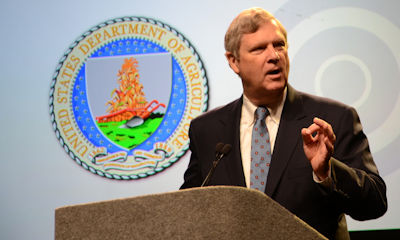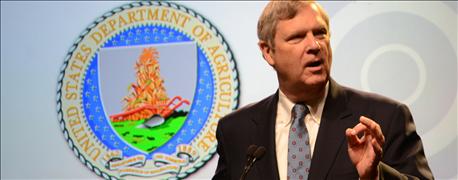March 4, 2016

Winding up the fourth longest tour as Secretary of Agriculture Tom Vilsack was keynote speaker at Commodity Classic in New Orleans, La., and took the "optimism" road. "I’m an optimist," he told the crowd. "We're on the cusp of expanding our market opportunities dramatically."
A cornerstone of that new potential is the Trans-Pacific Partnership agreement, which now awaits approval by Congress. "I'm a strong, unapologetic proponent of the TPP agreement," he says. "The region has ten times the population of the United States."

Secretary of Agriculture Tom Vilsack addresses his last Commodity Classic in New Orleans, La., and talks Trans Pacific Partnership agreement, Cuba trade and GMO labeling.
The agreement sets a framework for a level playing field for trade, science-based decision making and high standards for labor, the environment and sanitary-phyto-sanitary rules. "We have science, not politics, with this agreement," he says. "We can increase farm opportunity, but don't take it from me, the American Farm Bureau Federation has done a study on the impact of the agreement."
That report says that TPP would increase farm income by $4.4 billion and increase exports by $357 billion. And Vilsack notes that there's really no time to waste for two reasons:
1 – China is trying to negotiate its own agreement with Asian friends that Vilsack says will not offer U.S. a level trade playing field, won't have the same sanitary-phytosanitary rules and not be science based.
2 – delaying the agreement for just a year would cost the American economy $94 billion.
Vilsack points to the jobs report released before his speech that showed 242,000 jobs added and that was the 72nd consecutive month of job growth which is the longest period of job growth in U.S. History.
Other trade issues
Vilsack turned his attention to Cuba, where the continuing embargo has limited the ability to expand trade, though that country imports 80% of its food. "There is a hunger and willingness for greater connection with American agriculture in the country," he says. "We see tremendous opportunity and the country has been closed for two long."
He commented that the Cuba embargo doesn't work and should be lifted, but in the meantime he wants to get the ag trade ready. "We've asked for funding to have people in-country to evaluate the market opportunities and any barriers that may exist," he says.
Vilsack is headed to Peru and Chile to promote biofuels and the bioeconomy. Last year was the second best year for biofuels exports on record, and the agency is working to expand export opportunities for U.S. biofuels.
While he is optimistic Vilsack notes he's also a realist noting that China has been slow to build a more consistent regulatory framework that's science based. This has become a significant competitive issue as companies await biotech approvals before they can release their products for sale in the U.S.
Vilsack voiced his worry over the proposted ChemChina purchase of Syngenta, which he says he's watching closely. "We want a synchronized Chinese regulatory system," Vilsack says. "We don't want our seed companies put at a disadvantage."
In a media conference following his speech, Vilsack elaborated noting that they want to be sure the move doesn't give Syngenta some kind of home-field advantage for their biotech products over other countries. "Feeding this world is a huge challenge and we need all the innovation we can get," he says, adding that it shouldn't be slowed by politically motivated actions.
And the question about the deal he wants answered? "At least the question ought to be raised [concerning the acquisition] as to what precisely this will mean. It's a fair question."
GMO labeling
Vilsack went on record today in support of mandatory labeling of GMO content in foods. "We want to work with Congress to address the issue of labeling, it's an important one," he notes.
The Senate is already moving forward with a labeling bill, which was recently passed out of committee, which Vilsack says can help avoid the chaos of 50 different state labels, or the creation by food companies of their own labels. He adds that he hopes the labeling measure results in a kind of national standard that provides options – the smart label for example – to get information about the product beyond the label.
In the media conference, he elaborated on why he supports mandatory labeling rather than a voluntary national standard. "Here's the situation, we have to get 60 votes in the Senate to get something done, and at the end of the day," he notes. "The best way to get 60 votes is to have a label that is required."
He notes that while the label would be mandatory it wouldn't be a prescription. Instead he sees a number of labeling approaches that could meet a mandatory standard, while still avoiding confusion anc chaos.
During his speech, Vilsack added that farmers and consumers have a common cause – that the food produced is safe, affordable and that it offers extraordinary choice. "Farmers have been doing this forever," he adds.
Getting personal
Vilsack is looking at the end of his tenure in the position, which will wind down in about 10 months. While there's plenty of work to be done, these appearances are also a series of "lasts" like the last Commodity Classic. He took a moment to get personal with the Classic crowd, talking about his life from an orphanage in Pittsburgh to a law practice in Iowa (where he moved when he got married to work with his father-in-law).
"Each year in January and February, farmers would come into the office, and most would come with a grocery sack of records, a calendar with some numbers on it and dump the papers on my desk. They wanted me to calculate their taxes so they wouldn't pay any more than they would actually owe and that they didn't want to be charged more than $25," Vilsack recalled – and this story got a laugh.
"But I learned my first valuable lesson about ag. This is a tough business, a risky business, a hard business," he notes. "You can be the best and if nature doesn't cooperate or the markets don't cooperate, you can lose."
As he looks back on his tenure, Vilsack is loathe to say what his legacy may be, but did note he hoped future Ag Secretaries would "like this job, appreciate it and stay." The consistency Vilsack has provided provides a kind of partnership between political appointee and long-time staff member. He points to innovation work by the Farm Service Agency that will allow farmers to access their records at home, and adds that having consistence at the head of the agency can help root out some of "this innovative thought process."
He adds: "We see a lot of whiz-bang stuff with FSA to make it easy for farmers, and I hope that's one of the benefits of sticking around."
More coverage from Commodity Classic
Ron Moore, ASA first vice president, urges farmers to speak up for GMO labeling
National Corn Growers Association president Chip Bowling pledges to protect farmers and boost demand
About the Author(s)
You May Also Like






